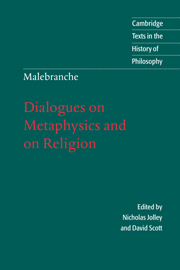Book contents
- Frontmatter
- Contents
- Acknowledgments
- List of abbreviations
- Introduction
- Chronology
- Further reading
- Note on the text
- Dialogues on Metaphysics and on Religion
- Dialogue I
- Dialogue II
- Dialogue III
- Dialogue IV
- Dialogue V
- Dialogue VI
- Dialogue VII
- Dialogue VIII
- Dialogue IX
- Dialogue X
- Dialogue XI
- Dialogue XII
- Dialogue XIII
- Dialogue XIV
- Index
- Cambridge texts in the history of philosophy
Dialogue VI
Published online by Cambridge University Press: 05 June 2012
- Frontmatter
- Contents
- Acknowledgments
- List of abbreviations
- Introduction
- Chronology
- Further reading
- Note on the text
- Dialogues on Metaphysics and on Religion
- Dialogue I
- Dialogue II
- Dialogue III
- Dialogue IV
- Dialogue V
- Dialogue VI
- Dialogue VII
- Dialogue VIII
- Dialogue IX
- Dialogue X
- Dialogue XI
- Dialogue XII
- Dialogue XIII
- Dialogue XIV
- Index
- Cambridge texts in the history of philosophy
Summary
Proofs of the existence of bodies drawn from revelation. Two kinds of revelation. How it happens that the natural revelations of sensations are an occasion for error for us.
ARISTES. What a difficult question you have given me to solve, Theodore! I was quite right to tell you that it was up to you, who know the strengths and weaknesses of the sciences and the utility and fecundity of their principles, to direct my steps in that intelligible world to which you transported me. For I confess I do not know where I should turn. What you have taught me can indeed aid me in preventing me from straying in that unknown land. To this end I need simply follow the light, step by step, and yield only to the evidence attending clear ideas. But it is not enough to advance; we also have to know where we are going. It is not enough constantly to discover new truths; we must know the location of these fertile truths which bestow on the mind all the perfection of which it is now capable, these truths which should regulate the judgments we must make concerning God and His admirable works, and should regulate the movements of our heart and give us a taste, or at least a foretaste, of the sovereign good we desire.
If, in choosing from the sciences, we had to adhere to evidence alone without considering utility, arithmetic would be preferable to all the others.
- Type
- Chapter
- Information
- Malebranche: Dialogues on Metaphysics and on Religion , pp. 89 - 103Publisher: Cambridge University PressPrint publication year: 1997

